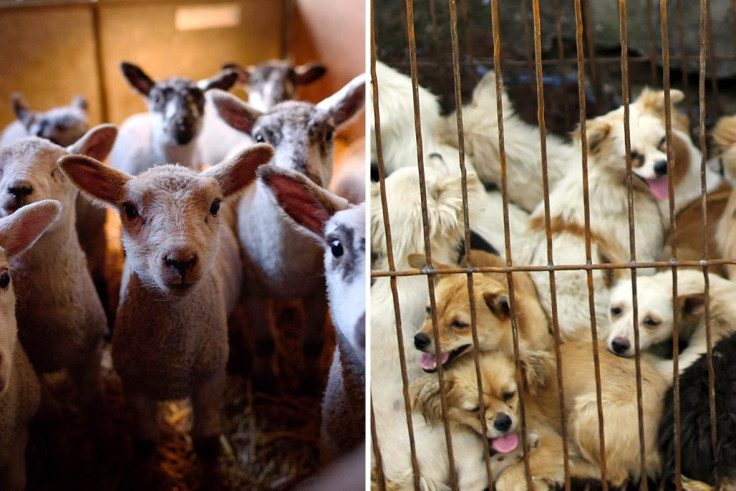Yulin Dog Meat Festival: Why feel disgusted about eating puppies but not lamb?
If you're outraged by the thought of eating dog but still put meat on the table, you're a hypocrite.
Every year in Yulin, China, thousands of dogs – and even a few cats – are barbarically slaughtered for a summer solstice gathering, and their flesh is sold as food. Commonly called the Yulin Dog Meat Festival, this event is vehemently condemned by the international community – and by many Chinese people, too. It's easy to see why: the thought of killing, cooking, dismembering and eating our animal companions is enough to make most of us lose our lunch.
But there's no rational reason why the thought of eating any other animal shouldn't elicit the same revulsion – especially when animals raised and slaughtered in Britain often face horrors akin to those endured by the dogs in Yulin.
Dogs killed and eaten in Yulin are regularly transported there from other cities. They are loaded into small cages and put on lorries, which may then travel for hundreds of miles to Yulin. The animals are often deprived of food, water and rest along the way. The same is true for millions of sensitive sheep, cows and other animals in the EU. Countries such as Ireland and France regularly export live animals to places as far away as Jordan and Libya. These living beings are loaded onto ships and lorries for hellish journeys often of thousands – not hundreds – of miles, only to meet their violent end.

We're particularly offended by the gruesome ways in which dogs in Yulin are typically slaughtered. Some are boiled alive – a horrifying death that makes most of us shudder. But right here in the UK, countless chickens and turkeys meet a similar fate every single day: at the abattoir, many of these intelligent birds miss the mechanical spinning blade meant to slit their throats, leaving them fully conscious as they move down the assembly line and are immersed in scalding-hot water to remove their feathers. Millions of innocent lambs die of exposure to the elements, malnutrition or disease within days of birth, while male lambs may be slaughtered for their flesh when they're only 10 weeks old.
Some dogs in Yulin will be clubbed in the head. This is certainly grotesque, but it is also business as usual for anglers who repeatedly bash in fishes's heads or beat brainy octopuses over rocks in order to "tenderise" the still-living animals. Some sea animals – all with the same capacity to feel pain as any dog or cat – will suffer decompression when hauled up from the depths of the sea, and their eyes may even burst out of their skulls.
Some Yulin restaurateurs believe that adrenaline adds flavour to animal flesh, which means dogs are typically killed in full view of other animals. This is horrifying, but let's imagine you're a British-raised pig – an animal whose cognitive abilities in many ways exceed those of dogs. You're forced out of a lorry by humans with electro-shock prods. You move with your herd into an abattoir that reeks of blood, and you can hear the terrified, frantic squeals of other pigs ahead of you. Your adrenaline is pumping – just like the dogs in Yulin, you know you're about to die and there's no escape.
During the Yulin festival's 10-day run, up to 15,000 dogs will be slaughtered. This is a despicable number to be sure – but also one that is far surpassed here at home: in the same 10-day span, nearly 29 million terrified animals will be killed to satisfy British appetites.
Whether a fish or a dog, a chicken or a sheep, no animal wants to suffer and die for our palate.
Pointing a finger at other cultures is easy – what's harder is facing the faults in our own behaviour and correcting them. Yes, let's be outraged by the cruelty that takes place during the Yulin Dog Meat Festival, but let's not be hypocrites about it. We should extend our compassion to all animals, not just dogs, by leaving them off our plates.
Mimi Bekhechi is the director of the People for the Ethical Treatment of Animals (PETA) Foundation.
© Copyright IBTimes 2025. All rights reserved.






















